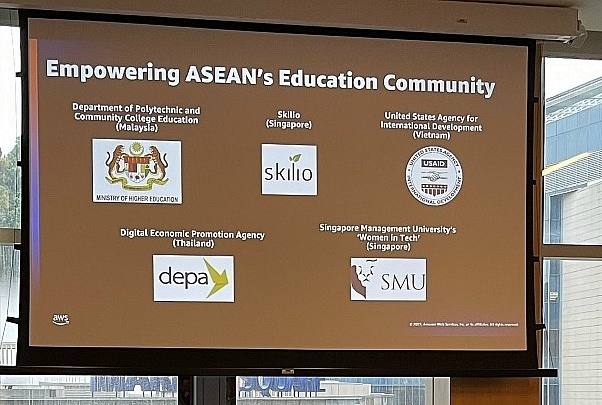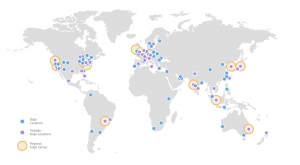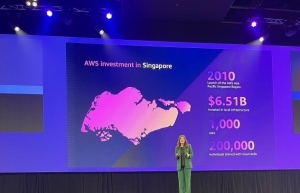INTERNATIONAL INVESTMENT
AND PORTAL
Amazon Web Services (AWS) has been cooperating with countries across ASEAN in upskilling to meet their digital transformation needs.
At the AWS Public Sector Summit 2022 held in Singapore in early October, AWS announced it is partnering with the Social Economic Accelerator Lab to accelerate digitisation and launch the Indonesiaku AWSome!, a five-month programme that provides comprehensive education on advanced cloud technologies.
AWS has also jointly developed “Cloud Ready SG with AWS” with the Singapore government, a holistic digital and cloud technology skilling programme curated for Singaporeans across segments.

Meanwhile, in Thailand, the Ministry of Digital Economy and Society is collaborating with AWS to train more than 1,200 public sector employees with cloud skills.
AWS is also working with educational institutions across the region, like Indonesia’s Ministry of Education and Culture, Singapore’s Ministry of Education, and Malaysia’s Ministry of Higher Education, to transform course delivery, enhance the student experience, and improve learning outcomes.
As a result, in Indonesia, the company has trained over three hundred thousand individuals with cloud skills since 2017. As expected, the AWS Asia Pacific (Jakarta) Region will create 24,700 direct and indirect jobs with an estimated $5 billion planned investment in the local economy. The AWS Asia Pacific (Jakarta) Region will add an estimated $10.9 billion over the next 15 years to Indonesia’s GDP.
In Singapore, AWS has trained over 200,000 individuals in Singapore with cloud skills since 2017. Following the launch of the AWS Asia Pacific (Singapore) Region in 2010, AWS has invested over US$6.51 billion in local infrastructure and jobs across Singapore. Amazon and AWS will collectively create 1,000 jobs in Singapore in 2022.
Talking to the media at the event, Emmanuel Pillai, head of AWS training and certification for ASEAN said, “ASEAN is undergoing rapid digital transformation but our opportunity to become leaders in the digital economy depends on having a robust workforce of skilled professionals to help us continue our pace of innovation. With the skills gap widening, now is the time for employers to upskill and reskill their workers with a sense of urgency.”
 People learnt about AWS cloud skills at Public Sector Summit Singapore in early October
People learnt about AWS cloud skills at Public Sector Summit Singapore in early October
Shang Gao, AWS regional lead of education to workforce said, “AWS is providing more equitable learning opportunities to nurture a diverse digital workforce. We are collaborating with governments and educational institutions to incorporate the latest content into mainstream education curricula so that students can gain in-demand cloud skills and are prepared for entry-level jobs. It is inspiring to see students across ASEAN leveraging AWS education programmes to increase their employability and drive industry innovation when they enter the workforce.”
AWS has helped train 700,000 individuals with cloud skills across ASEAN since 2017.
Singapore Management University (SMU) is a good example of how it benefits from AWS skills programmes. Professor Kyong Jin Shim from SMU said that she joined AWS’s cloud skills programmes in 2018 and was one of the first faculty members to start integrating AWS cloud content into her courses.
Next semester, she will teach an advanced elective course called Big Data Architecting (launched last year) using AWS cloud and course content. Professor Shim also lectures for the School of Law, where she focuses on helping students develop digital solutions for the public, especially the underprivileged, such as those with physical and mental disabilities.
In Vietnam, digital and cloud-related skills are increasingly in-demand in workplaces. This demand has only been exacerbated by the changes in operations, products, and services that the pandemic has induced across industries. AWS has been helping train the locals with cloud skills by launching Build On Vietnam, AWS re/Start in Vietnam, AWS Skill Builder, and AWS Educate.
According to an AWS 2022 report on building skills for the changing workforce in Asia-Pacific and Japan, 88 per cent of workers in the seven countries studied said they need more digital skills to adapt to job changes due to the pandemic. The report found an estimated 86 million more people in that region (14 per cent of the total workforce) will need to undertake digital skills training over the next year alone to keep pace with technological advancements.
ASEAN Digital Skills AlphaBeta Research Commissioned by AWS
Tech and non-tech workers
• Both tech and non-tech workers in Indonesia and Singapore stand to benefit from digital skills training. Non-tech workers report benefitting from greater efficiency (94 per cent of respondents), improved employability (92 per cent), and higher personal satisfaction (91 per cent). Tech workers similarly benefit from greater efficiency (93 per cent), higher personal satisfaction (92 per cent), and improved employability (91 per cent).
• Non-tech workers train less than tech workers and feel less ready for future digital skill demands. In Indonesia and Singapore, although 81 per cent of tech workers undertake digital skills training at least once a year, only 52 per cent of non-tech workers do so. Non-tech workers are also found to be less confident of their ability to meet future digital skill needs – 66 per cent do not feel confident, as compared to 52 per cent of tech workers.
• Non-tech workers indicate a great desire to undertake digital skills training, particularly in cloud-related skills. Among non-tech workers in Indonesia and Singapore who currently do not do any training, 82 per cent say that they want to do so within the next year. Non-tech workers are motivated to improve their productivity at work (72 per cent) and increase their employability (63 per cent).
Gender
• Female workers in Singapore and Indonesia are motivated to undertake digital skills training. The top motivations for female workers to undertake digital skills training are the desire to improve their productivity at work (70 per cent) and employability (64 per cent). 85 per cent of female workers who currently do not do any training indicate that they want to do so within the next year.
• Female workers have become more aware of the importance of digital skills training due to the pandemic. 96 per cent of female workers say the pandemic has made them realise the importance of digital skills. However, only 82 per cent of female workers have undertaken more training since the pandemic.
• Female workers can benefit significantly from digital skills training. 93 per cent improved their productivity at work and 91 per cent experienced improved employability upon undertaking digital skills training.
 Vietcetera goes all-in on AWS to grow globally
Vietcetera goes all-in on AWS to grow globally
Amazon Web Services (AWS), an Amazon company, announced on August 16 that Vietcetera, one of the fastest-growing digital media companies in Vietnam, has gone all-in on AWS to better serve 20 million users globally.
 AWS boosts presence in Vietnam with first two edge locations
AWS boosts presence in Vietnam with first two edge locations
Amazon Web Services, Inc. (AWS), an Amazon.com company, has marked its presence expansion in Vietnam by announcing on August 31 the launch of the first two AWS edge locations in the country located in Hanoi and Ho Chi Minh City.
 AWS offerings turbocharge wide support for customers in Vietnam
AWS offerings turbocharge wide support for customers in Vietnam
Amazon Web Services (AWS) is expected to increase investment in infrastructure and digital skills, and bring best practices to Vietnam as a way to increase its footprint in the market. Phil Davis, the US tech firm’s managing director for Asia-Pacific and Japan, discussed with VIR’s Bich Thuy the changes in its future business strategy here.
 Public Sector Summit 2022 - Empowering cloud technology in ASEAN
Public Sector Summit 2022 - Empowering cloud technology in ASEAN
The AWS Public Sector Summit opened in Singapore on October 6, discussing cloud transformation and the upscaling of cloud technology in ASEAN.
By Bich Thuy



















